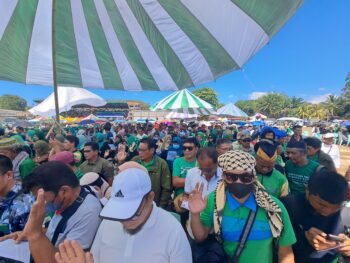 Students of Bukidnon National High School in Malaybalay City hold a march as part of the global Fridays for Future movement that urges governments to take a firm action to address climate change. MindaNews file photo by ALEXANDRIA M. MORDENO
Students of Bukidnon National High School in Malaybalay City hold a march as part of the global Fridays for Future movement that urges governments to take a firm action to address climate change. MindaNews file photo by ALEXANDRIA M. MORDENO
DAVAO CITY (MindaNews / 6 November) – World leaders must come up with more nature-based and sustainable agricultural policies and programs to curb greenhouse gas (GHG) emissions emanating from the agribusiness industry during the upcoming 2023 UN Climate Change Conference (COP 28) in Dubai, an activist said.
Leo XL Y. Fuentes Jr., regional coordinator of farmers’ group Masipag Inc., said Sunday that concrete programs must be put in place to address the problem since a significant chunk of GHG emissions are coming from the agricultural sector.
He believed that the current technological solutions employed by agribusinesses “don’t do much to solve the problem.”
“Techno-fixes of big agribusiness is clearly not the solution,” he said.
Fuentes said that he is optimistic that world leaders would arrive at tangible plans in addressing the climate emergency during the conference slated for November 30 to December 12.
But he believed that beyond “green funding,” there is a greater need to hold “industrial countries accountable” for their GHG emissions.
The COP28 will bring together world leaders, ministers and negotiators to “take action towards achieving the world’s collective climate goals as agreed under the Paris Agreement and the Convention (Conference of the Parties to the Convention).”
The “Paris Agreement” is a multilateral agreement, which entered into force on November 4, 2016. It targets to limit “global warming to well below 2, preferably to 1.5 degrees Celsius, compared to pre-industrial levels” as part of global efforts to combat climate change and adapt to its effects.
Under the agreement, countries “aim to reach global peaking of greenhouse gas emissions as soon as possible to achieve a climate neutral world by mid-century.”
The Philippines signed the Paris Agreement on April 23, 2016, and was subsequently ratified by the Senate on March 23, 2017 under the administration of former President Rodrigo R. Duterte.
Fuentes said he was dissatisfied with the country’s compliance with its commitment to the Paris Agreement because it is still “business as usual” for the country, with coal mines continuing to operate and expand in the country while petro-chemical-based inputs are still being used in the agricultural sector.
“Transportation is still inefficient and very much reliant on petrol,” he said.
In 2020, the Department of Energy declared a moratorium on the endorsements for greenfield coal power plants.
For her part, Ecoteneo director Mylai Santos said plastics-free policies must be strictly-enforced “given that plastics come from fossil fuels.”
She also encouraged more youth participation in local environmental issues like the construction of the Davao City-Samal Island Connector Project, which could kill the Paradise Reef.
She said coral reefs are the “rainforests of the sea and are more efficient carbon sinks.” (Antonio L. Colina IV / MindaNews)
